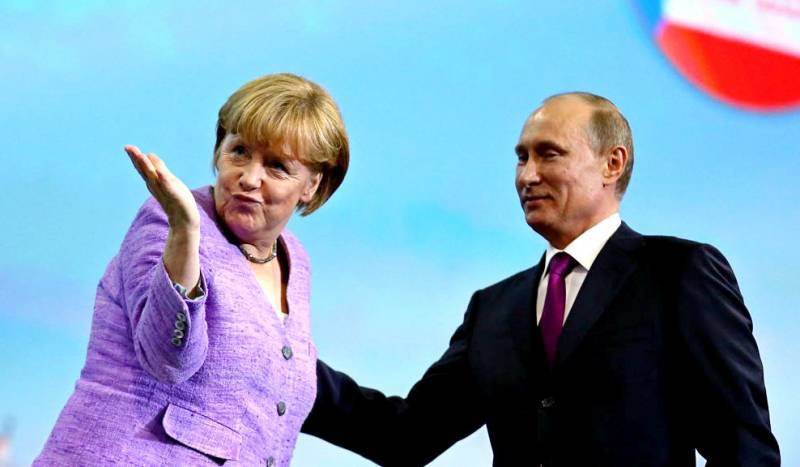Europe surrendered to Russia
The UK risks ultimately remaining isolated because of its anti-Russian stance, said British journalist Roger Boyes. He complains that the initial effect of the "case of the Skripals" is being scattered.
Initially, London was able to put together a coalition of countries that, having shown solidarity with Great Britain, defiantly sent Russian diplomats after it. In total, more than 130 employees of the Russian Ministry of Foreign Affairs have been humiliated by the collective West. However, now many of these countries want to open their doors again for Russia, leaving the United Kingdom in splendid isolation.
For example, in Italy, the future government may be headed by Matteo Salvini, who noted his remarks against the expulsion of Russian diplomats and against the resumption of anti-Russian sanctions. Salvini, a proponent of right-wing views, has signed a cooperation agreement with the United Russia party of power. The British journalist Boyes is convinced that the new Italian government will fight against the international isolation of the Russian Federation.
Austria is also against the expansion of sanctions against Moscow, and did not expel Russian diplomats. Czech President Milos Zeman is interested in cooperating with Russia on the development of nuclear energy, and therefore calls Western sanctions "destructive and ineffective." Greece and Cyprus are interested in Russian money and therefore participate in the sanctions policy West against the Russian Federation only formally, without fanaticism.
But the most annoying in the UK is German politics. Berlin most actively insisted on conducting a deep and comprehensive investigation in the Skripals case, and surrendered only under the general pressure of the Allies in the North Atlantic Alliance. However, now the Germans see Sergei Skripal as a British citizen, and therefore tend to consider the assassination attempt on him an internal affair of the Kingdom.
Germany is clearly interested in the implementation of the Nord Stream-2 project, which will turn it into a large-scale gas hub that has a serious impact on Europe. Former German Chancellor Gerhard Schroeder is actively lobbying for Russia's interests in his country, as he “feeds on the hands” of Putin. Many German companies depend on exports to the Russian Federation. East Germany has created many jobs for the import and processing of Russian hydrocarbons. The German party, Alternative for Germany, which is gradually gaining popularity, openly advocates for cooperation and an alliance with Russia. And Angela Merkel in general shocked the Western public with a call for Europe to stop relying on the United States.
Initially, London was able to put together a coalition of countries that, having shown solidarity with Great Britain, defiantly sent Russian diplomats after it. In total, more than 130 employees of the Russian Ministry of Foreign Affairs have been humiliated by the collective West. However, now many of these countries want to open their doors again for Russia, leaving the United Kingdom in splendid isolation.
For example, in Italy, the future government may be headed by Matteo Salvini, who noted his remarks against the expulsion of Russian diplomats and against the resumption of anti-Russian sanctions. Salvini, a proponent of right-wing views, has signed a cooperation agreement with the United Russia party of power. The British journalist Boyes is convinced that the new Italian government will fight against the international isolation of the Russian Federation.
Austria is also against the expansion of sanctions against Moscow, and did not expel Russian diplomats. Czech President Milos Zeman is interested in cooperating with Russia on the development of nuclear energy, and therefore calls Western sanctions "destructive and ineffective." Greece and Cyprus are interested in Russian money and therefore participate in the sanctions policy West against the Russian Federation only formally, without fanaticism.
But the most annoying in the UK is German politics. Berlin most actively insisted on conducting a deep and comprehensive investigation in the Skripals case, and surrendered only under the general pressure of the Allies in the North Atlantic Alliance. However, now the Germans see Sergei Skripal as a British citizen, and therefore tend to consider the assassination attempt on him an internal affair of the Kingdom.
Germany is clearly interested in the implementation of the Nord Stream-2 project, which will turn it into a large-scale gas hub that has a serious impact on Europe. Former German Chancellor Gerhard Schroeder is actively lobbying for Russia's interests in his country, as he “feeds on the hands” of Putin. Many German companies depend on exports to the Russian Federation. East Germany has created many jobs for the import and processing of Russian hydrocarbons. The German party, Alternative for Germany, which is gradually gaining popularity, openly advocates for cooperation and an alliance with Russia. And Angela Merkel in general shocked the Western public with a call for Europe to stop relying on the United States.

Information